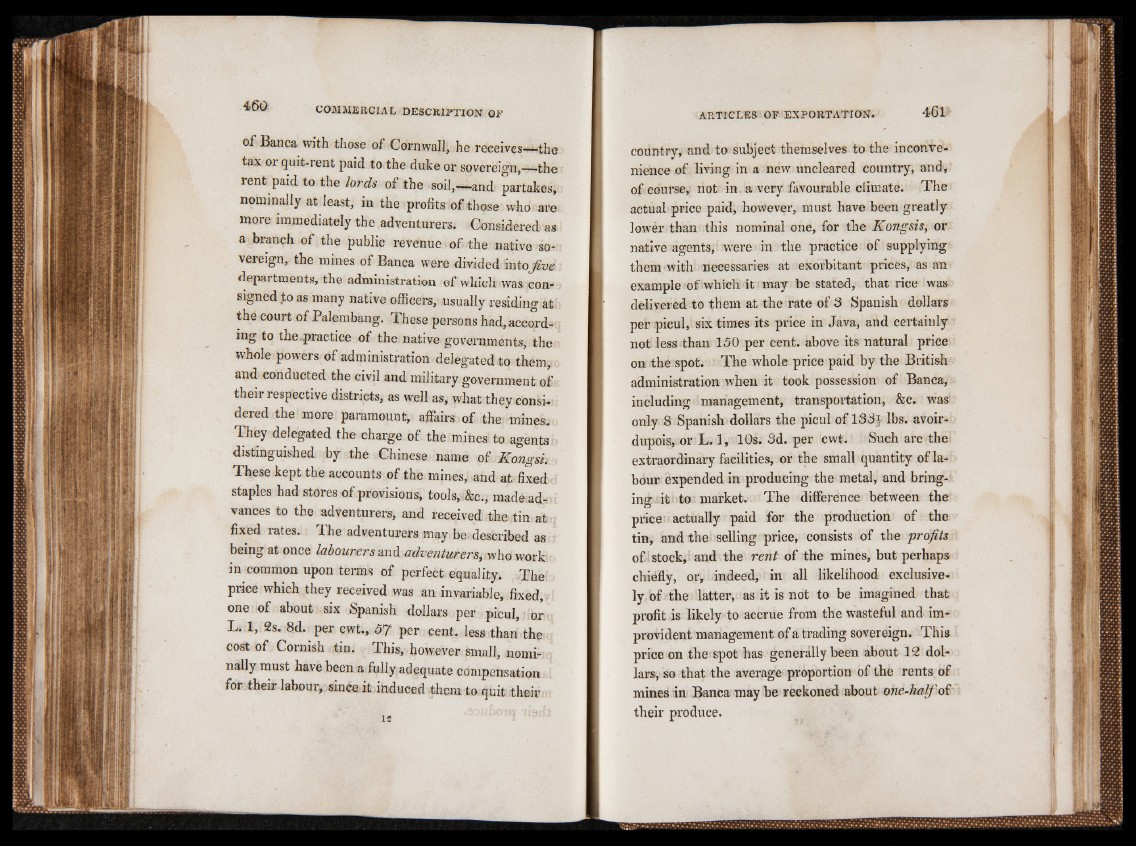
of Banca with those of Cornwall, he receives—the
tax or quit-rent paid to the duke or sovereign,——the
rent paid to the lords of the soil,—and partakes,
nominally at least, in the profits of those who are
more immediately the adventurers. Considered as
a branch of the public revenue of the native sovereign,
the mines of Banca were divided intoJive
depai tments, the administration of which was consigned
to as many native officers, usually residing at
the court of Palembang. These persons had, according
to the .practice of the native governments, the
whole powers of administration delegated to them,
and conducted the civil and military government of
their respective districts, as well as, what they considered
the more paramount, affairs of the mines.
They delegated the charge of the mines to agents
distinguished by the Chinese name of Kongsi.
These kept the accounts of the mines, and at fixed
staples had stores of provisions, tools, &c., made advances
to the adventurers, and received the tin at
fixed rates. The adventurers may be described as
being at once labourers and adventurers, who work
in common upon terms of perfect equality. The
price which they received was an invariable, fixed,
one of about six Spanish dollars per picul, or
L. 1, 2s. 8d. per cwt., 57 per cent, less than the
cost of Cornish tin. This, however small, nominally
must have been a fully adequate compensation
for their labour, since it induced them to quit their
country, and to subject themselves to the inconvenience
of living in a new uncleared country, and,
of course, not in a very favourable climate. The
actual price paid, however, must have been greatly
lower than this nominal one, for the Kongsis, or
native agents, were in the practice of supplying
them with necessaries at exorbitant prices, as an
example of which it may be stated, that rice was
delivered to them at the rate of 3 Spanish dollars
per picul, six times its price in Java, and certainly
not less than 150 per cent, above its natural price
on the spot. The whole price paid by the British
administration when it took possession of Banca,
including management, transportation, &c. was'
only 8 Spanish dollars the picul ofl33i lbs. avoirdupois,
or L. 1, 10s. 3d. per cwt. Such are the
extraordinary facilities, or the small quantity of labour
expended in producing the metal, and bringing
it to market. The difference between the
price actually paid for the production of the
tin, and the selling price, consists of the profits
of stock, and the rent of the mines, but perhaps
chiefly, or, indeed, in all likelihood exclusively
of the latter, as it is not to be imagined that
profit is likely to accrue from the wasteful and improvident
management of a trading sovereign. This
price on the spot has generally been about 12 dollars,
so that the average proportion of the rents of
mines in Banca may be reckoned about one-half of’
their produce.